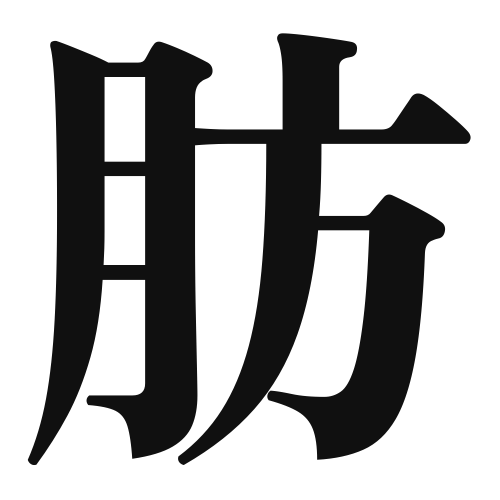1. Overview of Meaning
The kanji “肪” (pronounced “bō” in Japanese) means “fat” or “lipid.” It refers to the fatty tissues in the body and is often used in contexts related to health, nutrition, and cooking.
2. Formation and Radical
Formation of the Kanji: The kanji “肪” is a phonetic compound (形声文字) that combines the radical for “body” (肉) on the left, which relates to flesh or meat, with the phonetic component “房” (bō) on the right, which contributes to its pronunciation.
Radical: The radical of “肪” is 肉 (niku), which signifies “meat” or “flesh.” This radical is commonly found in kanji related to the body or food.
3. Examples of Usage
Common Words and Phrases:
- 脂肪 (しぼう, shibō) – “fat” or “lipid”
- 脂肪酸 (しぼうさん, shibōsan) – “fatty acid”
Example Sentences in Daily Conversation:
- 「この料理にはたくさんの脂肪が含まれています。」(This dish contains a lot of fat.)
- 「健康のために、脂肪の摂取を減らすべきです。」(For health reasons, we should reduce fat intake.)
4. Synonyms and Antonyms
Similar Kanji:
- 脂 (あぶら, abura) – “oil” or “fat,” which is often used in cooking contexts.
- 肉 (にく, niku) – “meat,” which refers to the flesh of animals and is related but not synonymous.
Antonyms:
- 痩せ (やせ, yase) – “thin” or “slim,” which describes a lack of fat.
- 軽 (かる, karu) – “light,” which can imply a lack of weight, often associated with less fat.
5. Cultural and Historical Background
Relation to Japanese Culture: In Japanese culture, the concept of fat is often associated with health and beauty standards. Traditional diets emphasize balance, and the understanding of fats is crucial in cooking.
Proverbs and Idioms:
- 「脂肪は敵」(Fat is the enemy) – This phrase reflects the modern health consciousness regarding fat consumption.
- 「肉は脂肪を含む」(Meat contains fat) – A straightforward observation that highlights the relationship between meat and fat.
